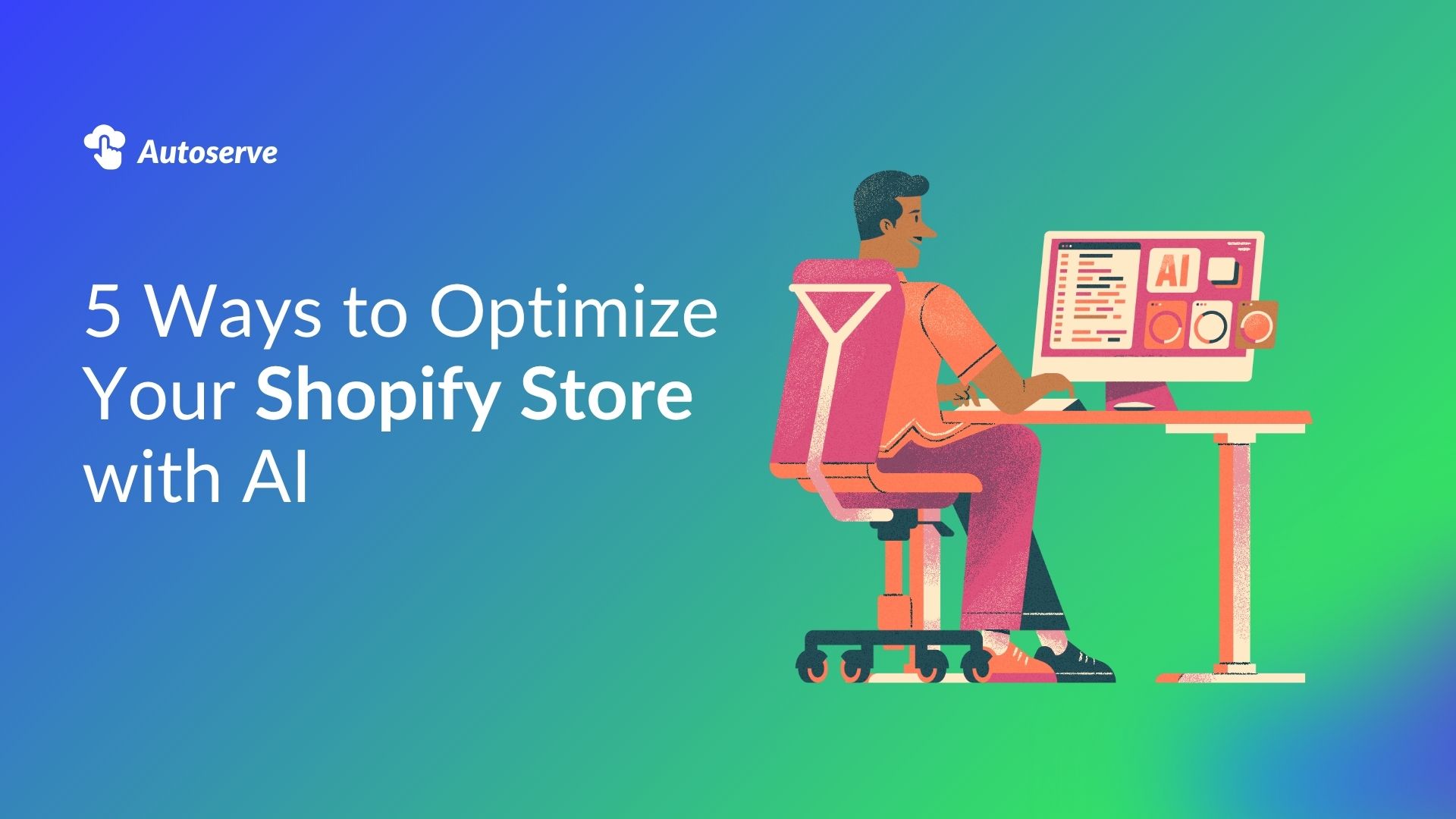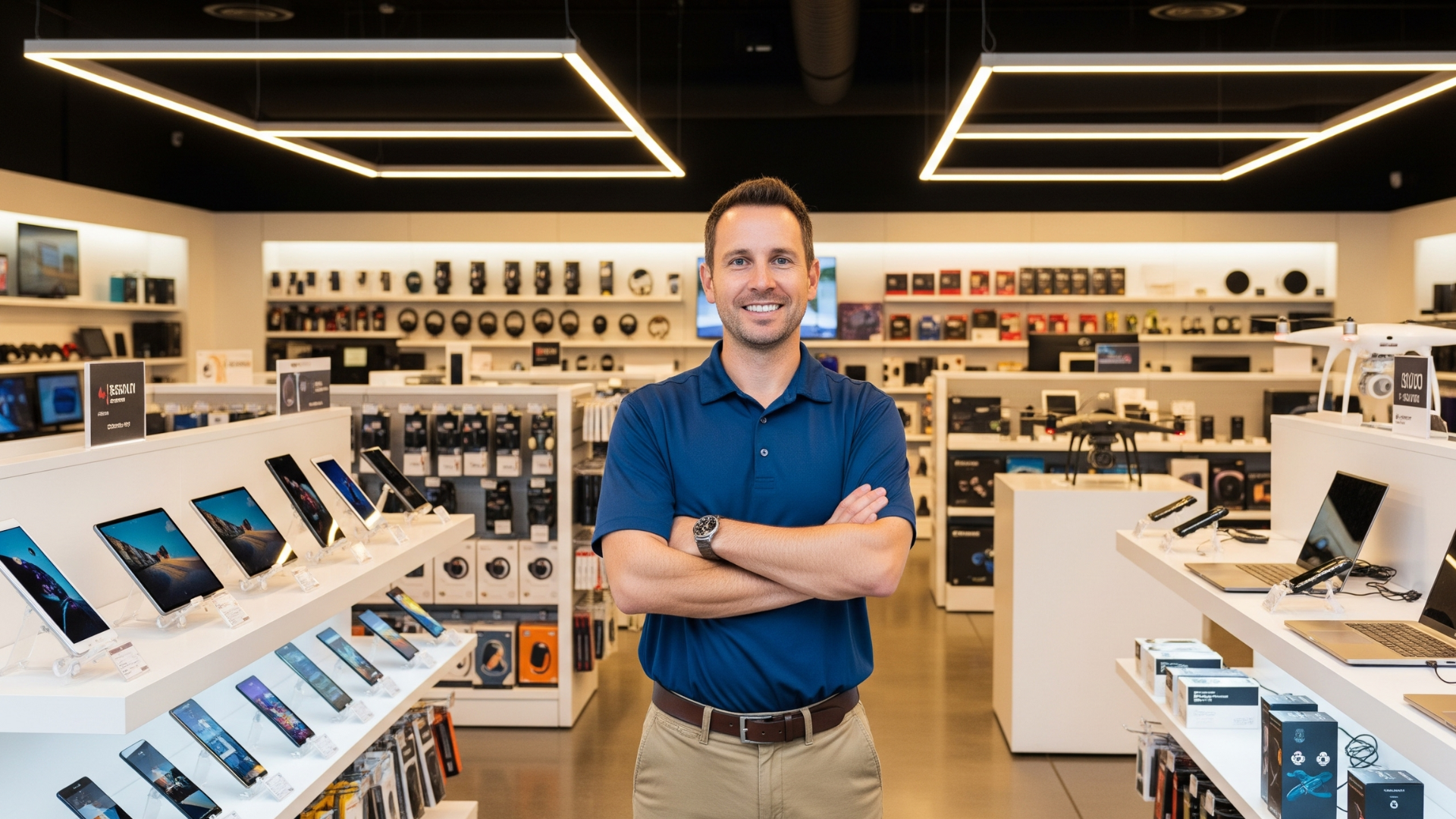
You started your Shopify store with a passion. Maybe it was for handcrafted leather goods, artisanal coffee, or a unique line of sustainable fashion. You poured your heart into product design, sourcing, and building a beautiful storefront. And now, you’re the CEO, the marketer, the customer service rep, the content creator, and the shipping department, all rolled into one. You're drowning in a sea of a thousand tiny tasks, wondering how you'll ever find the time to actually grow the business.
What if you had a brilliant co-pilot? A tireless assistant who could write compelling product descriptions at 3 AM, answer customer queries instantly, predict what your customers want to buy next, and protect you from fraud—all at the same time?
This isn't science fiction. This is the reality of Artificial Intelligence in e-commerce. AI is no longer a futuristic buzzword; it's an accessible, powerful toolkit that can help you optimize your Shopify store in ways that were previously unimaginable. It’s about replacing guesswork with data-driven precision and freeing up your most valuable resource—your time—to focus on what you love.
This guide will walk you through five practical, revolutionary ways you can leverage AI right now. We'll show you how to optimize your Shopify store for more sales, better efficiency, and a truly exceptional customer experience.
For years, the key to a successful online store was a combination of intuition, hard work, and a bit of luck. But the landscape has shifted. We're now in the age of intelligent commerce, where data is the new currency and AI is the engine that processes it. Store owners who fail to adapt risk being left behind, outmaneuvered by competitors who are faster, smarter, and more efficient.
.png)
Don't just take our word for it. The numbers paint a vivid picture of this transformation.
The message is clear: integrating AI is no longer an optional upgrade; it's a fundamental strategy if you want to effectively optimize your Shopify store for long-term success. It’s about working smarter, not just harder.
So, where do you begin? The world of AI can seem vast and intimidating. We’ve broken it down into five key pillars—five practical areas where you can implement AI today to see a tangible impact on your business. For each pillar, we'll tell the story of a Shopify store owner, just like you, who used a specific AI tool to solve a real-world problem.
The days of a one-size-fits-all storefront are over. Modern customers, especially in the competitive US market, expect experiences tailored to them. True personalization goes beyond using their first name in an email. It’s about anticipating their needs and showing them the right product at the right time. This is a crucial way to optimize your Shopify store and increase customer lifetime value.
The Story of Liam and His Hot Sauce Empire:
Liam runs "Fuego Finds," a Shopify store selling artisanal hot sauces. His sauces were getting great reviews, but his analytics showed a frustrating pattern: customers would buy one bottle and leave. His Average Order Value (AOV) was stagnant. He knew his customers would love his other sauces if they just tried them, but he didn't know how to encourage them to explore.
He decided to try Rebuy, an AI-powered personalization platform. The AI engine instantly got to work, analyzing his sales data, customer Browse patterns, and product correlations. The results were transformative.

Now, when a customer adds Liam's popular 'Smoky Chipotle' sauce to their cart, Rebuy’s AI triggers a smart pop-up: "You've got great taste! Customers who loved this sauce also went crazy for our 'Mango Habanero Madness'." In the cart, it doesn't just show a static list; it displays a dynamic, personalized offer: "Upgrade to the 'Grill Master Trio' and save 15%." On the post-purchase thank you page, it showcases a subscription offer for their favorite sauce.
Liam's AOV jumped by 22% within two months. Customers were discovering new products they genuinely loved, turning one-time buyers into loyal fans. Liam didn't have to manually create these rules; the AI did the heavy lifting. He learned that to truly optimize your Shopify store, you need to make every step of the shopping journey feel like it was designed for that individual customer.
Your product descriptions, blog posts, and email copy are your digital salespeople. But writing compelling content for dozens, or even hundreds, of products is an exhausting, time-consuming task that can steal your focus from product development and marketing strategy. If you want to optimize your Shopify store at scale, you need to automate content creation without sacrificing quality.
The Story of Clara and Her Candle Company:
Let's return to Clara, the passionate but overwhelmed founder of "Lumin Essence," a store for handmade candles. She had just perfected 50 new autumn scents, but the thought of writing 50 unique, evocative, and SEO-friendly product descriptions filled her with dread. It was a bottleneck preventing her from launching her new collection.
.png)
Feeling defeated, she explored the tools within her own Shopify admin and discovered Shopify Magic. It was an AI content generator built right into her dashboard. Skeptical but desperate, she gave it a try for her "Autumn Hearth" candle. She typed in a few keywords: cozy, crackling fire, vanilla, cinnamon, clove, warm blanket.
She clicked "Generate." In less than ten seconds, Shopify Magic produced a beautiful description: "Wrap yourself in the comforting embrace of a crackling fire. Our Autumn Hearth candle blends creamy vanilla and spicy cinnamon with a hint of clove, creating a warm, inviting aroma that turns any room into a cozy sanctuary. Perfect for crisp evenings and moments of pure relaxation."
Clara was stunned. It was better than what she would have written herself after an hour of work. In one afternoon, she generated unique, high-quality descriptions for her entire collection. The AI handled the creative heavy lifting, allowing her to optimize her Shopify store by launching her new line weeks ahead of schedule. She realized AI wasn't a replacement for her creativity, but a tool to amplify it.
In today's fast-paced world, customers expect instant answers. A delayed response to a simple question like "Where is my order?" can be the difference between a happy customer and a lost sale. But staffing a 24/7 support team is impossible for most small businesses. This is where AI-powered customer service platforms become essential to optimize your Shopify store.
The Story of Maria and Her Fashion Boutique:
Maria runs "City Threads," a trendy online fashion boutique. As her store grew, so did her inbox. She and her small team were spending hours every day answering the same questions over and over: "What's your return policy?", "Do you ship to Texas?", "Where's my package?". This left them no time to handle more complex, high-value inquiries about styling advice or fit, which are crucial for selling fashion online.

She integrated Gorgias, a customer service helpdesk built for Shopify. Its AI features immediately changed the game. Gorgias's AI can detect the intent of a customer's message.
Now, when a customer emails, "Where is my order?", the AI instantly responds with the real-time tracking information, pulling the data directly from Shopify. When someone asks about returns, the AI sends back a link to the policy and a pre-filled return form. It automatically closed 60% of incoming tickets without any human intervention.
This freed Maria's team to focus on what they do best: being human. They could now spend their time as personal stylists, offering detailed advice, building relationships, and upselling. Customer satisfaction scores soared, and so did sales. Maria learned that to optimize your Shopify store for customer loyalty, you need to automate the robotic questions to make more time for human connections.
Effective marketing is about delivering the right message to the right person at the right time. But manually sifting through customer data to create targeted segments is a monumental task. AI can act as your personal data scientist, identifying patterns and automating campaigns with a level of precision that's nearly impossible to achieve manually. This is a high-impact way to optimize your Shopify store's marketing ROI.
The Story of David and His Coffee Subscription:
David, owner of "Artisan Roast Collective," sells premium, single-origin coffee beans. His goal was to build a loyal base of subscribers, but his generic, one-size-fits-all email newsletters weren't working. Open rates were low, and conversions were even lower.
.png)
He turned to Klaviyo, an email marketing platform with powerful predictive AI. Klaviyo's AI dug into his Shopify data and began to work its magic. It automatically identified customer segments David had never even considered:
1. "High-Value Espresso Lovers" (customers who frequently bought dark roasts).
2. "At-Risk of Churning" (subscribers who hadn't purchased in 90 days).
3. "Potential Subscribers" (customers who had made multiple one-time purchases).
Armed with this intelligence, David set up automated flows. The "Espresso Lovers" automatically received an announcement about a new Italian roast. The "At-Risk" group got a friendly "We Miss You!" email with a 15% off coupon. The "Potential Subscribers" were sent a compelling offer to subscribe and save.
The results were staggering. His email marketing ROI tripled. By using AI to understand his customers on a deeper level, David was able to optimize his Shopify store by sending messages that felt personal and relevant, turning his email list from a static directory into a dynamic revenue-generating engine.
For an e-commerce owner, a chargeback is a gut punch. You lose the revenue from the sale, the product itself, and you get hit with a penalty fee. As your store grows, you become a bigger target for fraudsters. Manually screening every order is impractical and unreliable. AI-driven fraud prevention is a critical, non-negotiable tool you need to optimize your Shopify store and protect your bottom line.
The Story of Sam and His Electronics Store:
Sam sells high-end headphones and audio equipment on his store, "Sound Stage." He was thrilled with his growth until he was hit with a series of fraudulent chargebacks in one week, costing him over $2,000. He felt helpless and vulnerable.

A fellow merchant recommended Signifyd, an AI-powered fraud protection platform. Signifyd’s AI algorithm instantly analyzes thousands of data points for every single transaction—IP address, email domain age, proxy usage, device fingerprint, and mismatches between billing and shipping addresses.
A few days after installing it, a large order came through. To Sam, it looked legitimate. But Signifyd's AI instantly flagged it as high-risk. The order was placed from an IP address in one country, with a credit card from another, and a shipping address to a third-party freight forwarder in a third. The AI gave the order a "fraud score" of 9.8 out of 10. Sam canceled the order and avoided a guaranteed $1,200 loss.
Signifyd gave Sam peace of mind. He could now focus on growing his business, confident that a powerful AI was standing guard, protecting his revenue 24/7. He learned that the best way to optimize your Shopify store is not just about increasing sales, but also about protecting the sales you've already made.
It’s natural to hear all this and feel a twinge of fear. Will AI make my role obsolete? The answer is an emphatic no.
Think of AI as your co-pilot. It can handle the complex calculations, navigate through data-heavy storms, and manage the routine checklists, freeing you, the pilot, to focus on the destination. You still provide the vision, the brand strategy, the human empathy, and the creative spark that AI can't replicate.
As e-commerce strategist Meisha Williams puts it, "The most successful brands of the next decade won't be the ones that simply automate everything. They will be the ones that masterfully blend AI's efficiency with authentic, irreplaceable human connection."
Use AI to write a first draft, but use your voice to add the final polish. Use AI to answer common questions, but use your empathy to solve complex customer problems. Use AI to identify trends, but use your intuition to make the big strategic bets. The goal is to optimize your Shopify store through collaboration, not replacement.
The journey to optimize your Shopify store can feel like an uphill battle against a thousand competing priorities. But you now have the most powerful ally in history: Artificial Intelligence.
From personalizing every customer's shopping journey and automating your content creation, to providing instant support, sharpening your marketing, and standing guard against fraud, AI is ready to be your partner in growth. These aren't far-off dreams; they are practical tools you can implement on your Shopify store this week.
Don't let the future pass you by. Embrace the power of AI not as a threat, but as your greatest opportunity. Pick one pillar from this guide—just one—and explore how an AI tool can help you optimize your Shopify store. Take the first step today. Your future self, and your bottom line, will thank you.
We try to make easy and simple for every professionals. Get 30 days free trial - No credit card required.
